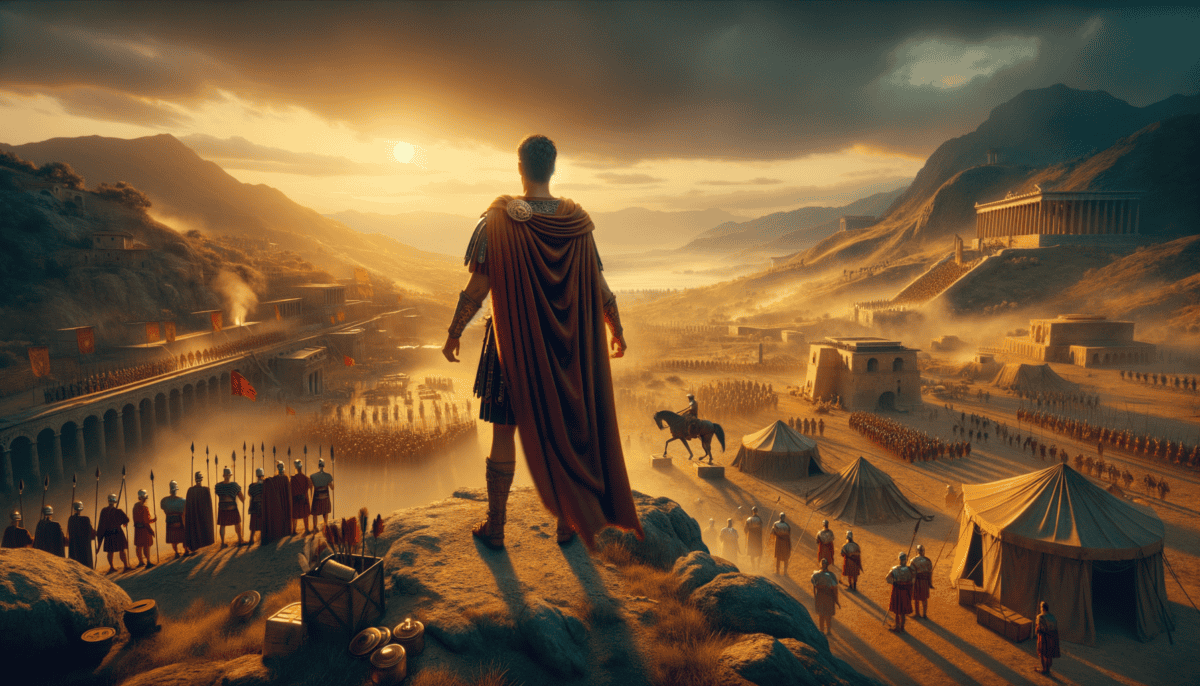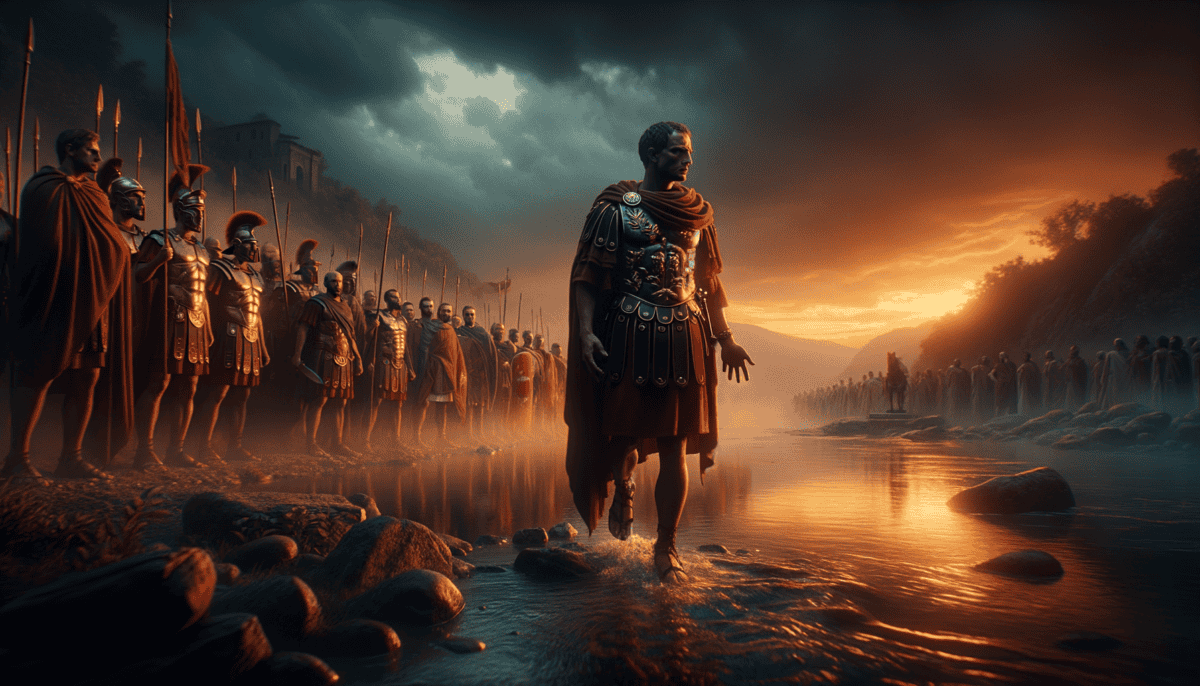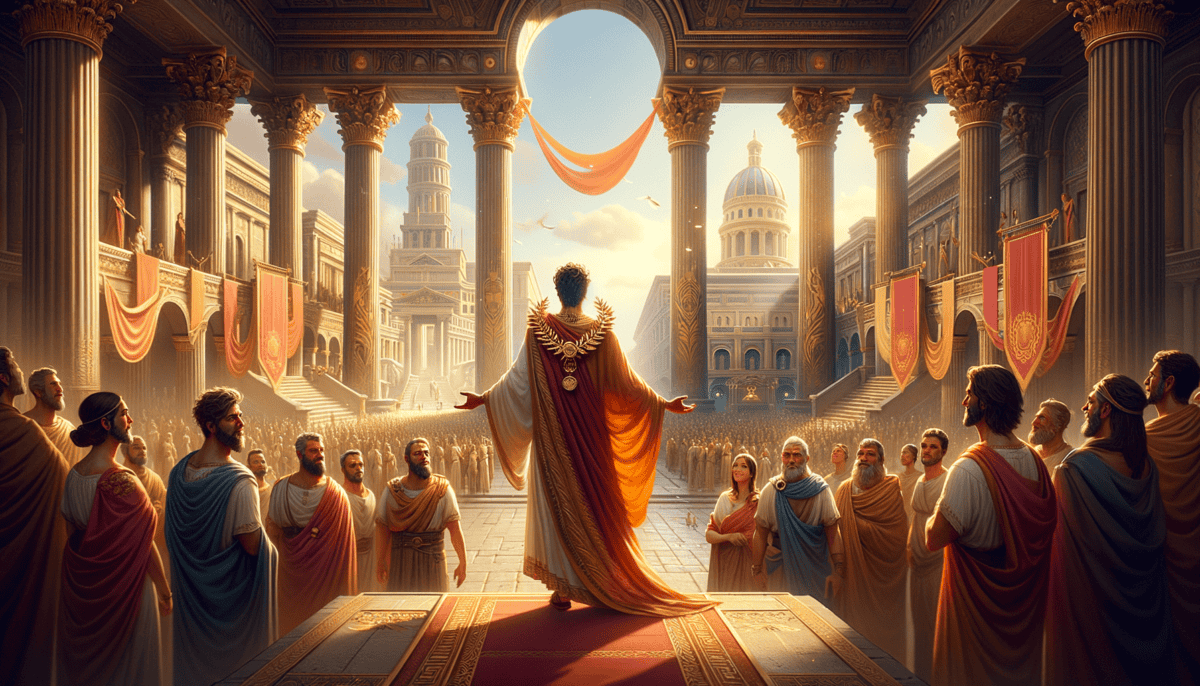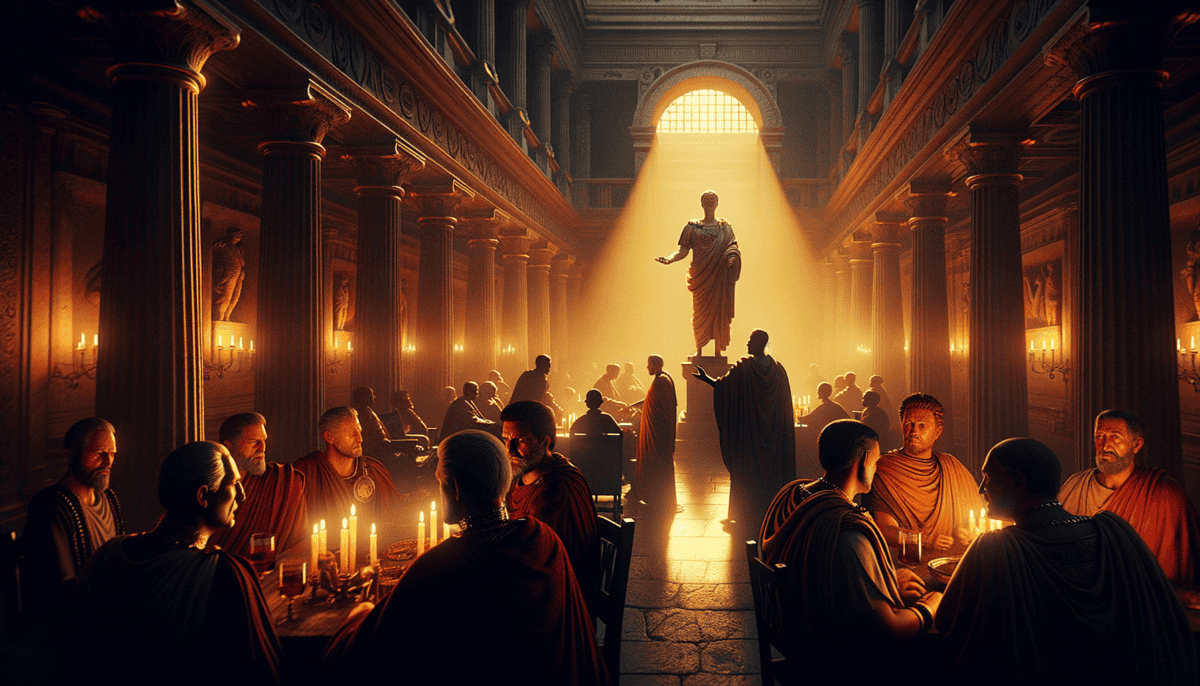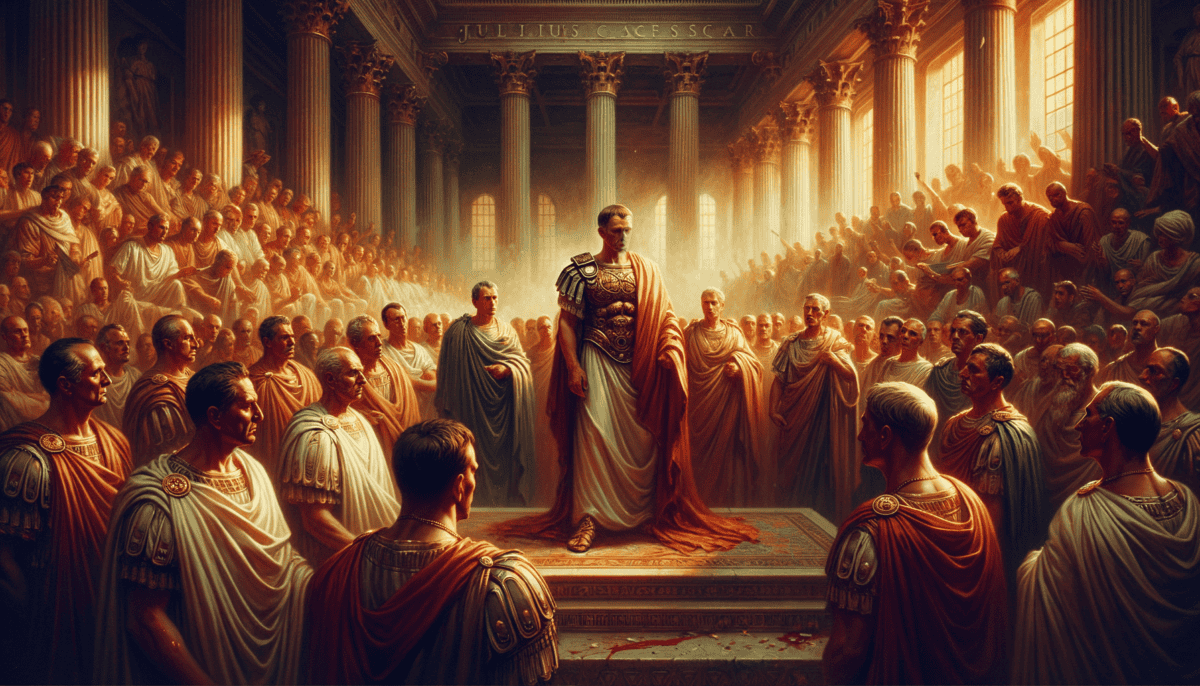The Young Eagle
The sun rose over the seven hills of Rome as young Julius woke up in his family's villa. It was 100 BC, and the city buzzed with energy. Little did anyone know that this 13-year-old boy would one day change the world.
"Julius! Time for your lessons!" his mother Aurelia called out.
Young Julius jumped out of bed, his dark eyes sparkling with excitement. He wasn't like other Roman boys who complained about their studies. He loved learning.
"Coming, Mother!" he shouted, quickly putting on his toga.
Their home sat on the Subura hill, a nice part of Rome where important families lived. Through his window, Julius could see the busy streets below. People walked around in white togas, merchants sold their goods, and soldiers marched in shiny armor.
Fun Fact: Young Julius had to learn three languages – Latin, Greek, and Etruscan!
His father, also named Julius, was telling stories about their family over breakfast. "We come from a long line of noble Romans," he said proudly. "Our family, the Julii, traces our roots back to the goddess Venus herself!"
Young Julius listened with wide eyes. He especially loved hearing about his uncle Marius, a famous Roman general.
"Will I be a great leader too, Father?" Julius asked.
His father smiled. "With hard work and courage, you can be anything you want."
But life wasn't always easy for young Julius. Some kids made fun of his high-pitched voice. Instead of getting upset, he practiced speaking for hours. He wanted to be the best at everything he did.
These are the things young Julius loved to do:
- Practice sword fighting with wooden sticks
- Learn about great battles from history
- Give speeches to anyone who would listen
- Study maps of far-away lands
- Race his friends through the streets of Rome
One day, while watching soldiers train, Julius made an important decision. "I'm going to join the army when I'm older," he told his friend Marcus. "And then I'll become the greatest leader Rome has ever seen!"
Marcus laughed. "You? The skinny boy with the funny voice?"
But Julius just smiled. He knew something that others didn't understand yet – he had the heart of an eagle, ready to soar above them all.
His first chance to prove himself came when he was sixteen. Pirates attacked a Roman ship near their port. While other boys ran away scared, Julius helped organize the sailors to fight back.
"Look at young Caesar!" the adults said, using his family name. "He thinks like a general already!"
At night, Julius would often sit on his roof, looking at the stars over Rome. He dreamed of battles, victories, and glory. But most of all, he dreamed of making Rome greater than it had ever been.
"One day," he whispered to himself, "everyone will know the name Caesar."
The cool night breeze carried his words across the sleeping city, almost like a prophecy. The young eagle was spreading his wings, preparing for a flight that would change history forever.
His mother found him there, still stargazing. "Time for bed, my little warrior," she said softly.
"Mother," Julius said seriously, "do you think I can really be great someday?"
Aurelia hugged him close. "You already are great, my son. But remember – true greatness comes not just from winning battles, but from how you treat others."
Young Julius nodded thoughtfully. He didn't know it yet, but these early lessons would shape him into the leader he would become. As he drifted off to sleep that night, his dreams were filled with visions of future glory, while Rome's destiny quietly took shape in the heart of a boy who dared to reach for the stars.
The Battle for Gaul
Julius Caesar stood at the edge of a misty field in Gaul, now called France. He was no longer the dreaming boy from Rome – he was now a strong general leading a mighty army. ️
“Look at those forests, sir,” said his trusted friend Labienus. “The Gauls could be hiding anywhere.”
Caesar smiled. He had waited for this moment. After becoming a leader in Rome, he had asked to be sent north to fight. Now he would show everyone what he could do.
Important Battle Fact: Caesar’s army had 40,000 brave soldiers ready to fight!
“Our men are ready,” Caesar said, looking at his soldiers preparing their shields and swords. “We will show Rome what we can do.”
The morning fog slowly lifted to show thousands of Gallic warriors on the other side of the field. They had long mustaches and carried bright shields. Their leader, Vercingetorix, was tall and proud on his white horse.
Caesar did something no one expected. Instead of just fighting, he taught his men to build things too. They made:
- Strong walls around their camps
- Bridges to cross rivers
- Big towers to watch for enemies
- New roads through the forests
- Special tools for fighting
“Why are we building so much?” a young soldier asked one day.
Caesar patted the boy’s shoulder. “To win a war, you must be smart, not just strong. Every wall we build helps protect our men. Every road we make helps us move faster than our enemies.”
But not everything was easy. One cold morning, scouts ran into camp shouting, “The Gauls are coming! Thousands of them!”
Caesar jumped on his horse. “Form the lines!” he called out. His voice was now deep and strong – no one made fun of it anymore.
The battle was hard. Swords clashed and shields banged. The noise was like thunder. But Caesar rode up and down the lines, shouting encouragement to his men:
“Stand together! Fight as one! For Rome!”
His soldiers loved him because he fought beside them and shared their hard times. When food was scarce, he ate the same simple meals they did. When it rained, he got wet just like them.
After many battles, Caesar wrote letters back to Rome: “I came, I saw, I conquered!” The people loved reading about his victories. His fame grew bigger and bigger.
But some people in Rome were getting worried. “Caesar is becoming too powerful,” they whispered. “His army loves him too much.”
Caesar didn’t care about these whispers. He was busy winning more land for Rome and teaching the Gauls about Roman ways. He even made friends with some Gallic leaders who joined his side.
One evening, as Caesar sat in his tent looking at maps, Labienus came in with news. “Sir, Vercingetorix wants to surrender. We’ve won Gaul!”
Caesar nodded slowly. He had done what he promised – shown everyone how great he could be. But something in his heart told him this was just the beginning.
“Tomorrow we make peace,” he said. “But soon, Rome will need us again.”
As night fell over the conquered lands of Gaul, Caesar walked among his sleeping soldiers. The eagle from Rome had spread his wings far from home, but his greatest flights still lay ahead.
The Rubicon’s Call
The winter wind howled across northern Italy as Caesar stood on the banks of a small river called the Rubicon. His red cape fluttered behind him like a flag.
“General, we shouldn’t be here,” whispered Mark Antony, Caesar’s loyal friend. “The Senate said you must stay in Gaul.”
No Roman general was allowed to bring an army across this river. It was against the law.
Caesar looked at his soldiers waiting behind him. They had fought together for years in Gaul. Now the Senate wanted to take his army away and make him come back to Rome alone.
“They’re afraid of you,” Mark Antony said. “Pompey has turned against us too.”
Caesar’s heart felt heavy. Pompey had once been his friend and even married his daughter Julia. But now Pompey sided with the Senate against him.
A Moment of Choice
The river splashed softly against its banks. Caesar picked up a small stone and tossed it into the water.
“Sir,” a soldier called out. “What should we do?”
Caesar thought about Rome. He remembered being a boy there, dreaming of glory. Now he was the most famous general in the world. But the Senate wanted to take it all away.
“Sometimes,” Caesar said to his men, “we must be brave and do what we think is right.”
He took one step into the cold water. Then another. His soldiers watched in silence.
“The die is cast!” Caesar shouted. It meant there was no turning back now.
His army cheered and followed him across. They marched through towns and villages, and something amazing happened – more people joined them! Farmers, traders, and even other soldiers came to fight for Caesar.
Mark Antony smiled. “The people love you, General.”
But in Rome, there was panic. Pompey and the senators grabbed their money and ran away to Greece. They were scared of Caesar’s army.
The Empty City
When Caesar reached Rome, the streets were quiet. No one tried to stop him. He walked up to the Senate building and sat in the big chair.
“What now, sir?” asked a soldier.
“Now we fix Rome,” Caesar said. “We make it better for everyone, not just the rich senators.”
He wrote new laws to:
- Help poor people get food
- Give land to his loyal soldiers
- Make peace in the city
- Build new roads and buildings
- Create jobs for workers
But far away in Greece, Pompey was building a new army. The fight wasn’t over yet.
Caesar stood at a window looking over Rome. The sun was setting, painting the city gold. He had crossed his river, broken the old rules, and changed everything. There was no going back now.
“Tomorrow,” he said to Mark Antony, “we sail for Greece. Pompey must learn that the new Rome is here to stay.”
As night fell over the seven hills of Rome, Caesar walked through the empty Senate house. He had won his first big fight without swinging a sword. But the hardest battles were still to come.
Power’s Price
Caesar sat in his golden chair in Rome’s great hall. The morning sun streamed through tall windows, making his new crown sparkle.
“More people want to see you, mighty Caesar,” said a guard at the door.
Caesar sighed. Being the boss of Rome was harder than fighting wars. Every day, people came with problems to fix.
The whole city watched his every move. Some with love, others with worry.
New Rules for Rome
“Let them in,” Caesar waved. A group of senators walked in, wearing white togas with purple stripes.
“Great Caesar,” one bowed low. “The people are hungry. The food shops are empty.”
Caesar stood up. He remembered being a boy and seeing poor people beg for bread. Now he could help them.
“Mark Antony!” he called. His friend hurried over. “Send ships to Egypt. Buy grain for the people. Every family in Rome gets food.”
The senators whispered. No ruler had ever done this before.
Friends and Foes
Later, in his private garden, Caesar met with Brutus, a young senator he trusted like a son.
“Some people say you’re becoming a king,” Brutus said quietly.
Caesar touched his crown. “I only want to make Rome better. Kings take. I give.”
He showed Brutus his plans:
| Old Rome | New Rome |
|---|---|
| Only rich people vote | More people can vote |
| Unfair taxes | Better tax rules |
| Small army | Strong army |
| Poor roads | New roads everywhere |
Brutus nodded, but his eyes looked worried. Caesar didn’t notice.
Rumors in the Dark
That night, in a dark room across Rome, Cassius met with other senators.
“He’s too powerful,” Cassius whispered. “He changes our oldest laws.”
“But the people love him,” someone said.
Cassius leaned forward. “Then we must make them see he’s dangerous. A man who wants to be king is an enemy of Rome.”
Back in his palace, Caesar worked late into the night. He drew maps for new roads and wrote laws to help farmers. His candle burned low.
“My lord,” a servant came in. “You should rest.”
“Rome doesn’t rest,” Caesar smiled. “So neither can I.”
But in the shadows of his great city, some people were already planning his fall. Power had brought Caesar to the top of Rome. Now he would learn its price.
Shadows of Betrayal
The sun was setting over Rome’s seven hills, casting long shadows across the marble streets. Caesar walked through his garden, thinking about tomorrow’s Senate meeting.
“My lord,” a servant rushed up. “A warning came for you!”
Caesar took the small clay tablet. Written in shaky letters was: “Watch your friends closely.”
Secret Meetings
That same evening, Brutus paced in his dimly lit study. Cassius sat in a corner, whispering:
“Sixty senators have joined us. We must act soon.”
“He was like a father to me,” Brutus said softly, touching an old ring Caesar had given him.
“Rome needs you to be strong,” Cassius pressed. “He’s becoming too powerful. Remember what happened to kings in Rome’s past?”
Warnings and Whispers
Caesar’s wife Calpurnia woke screaming that night.
“I saw you covered in red,” she grabbed Caesar’s arm. “Please be careful!”
Caesar patted her hand. “Dreams are just dreams, my dear.”
| Signs Caesar Missed | What They Meant |
|---|---|
| Whispers in the Senate | Growing anger |
| Friends acting strange | Hidden plans |
| Warning messages | Real danger |
The Web Tightens
Next morning, Mark Antony tried to warn Caesar.
“Something’s not right,” he said. “Let me double your guards.”
Caesar laughed. “Rome’s my family. Family doesn’t hurt family.”
But across the city, Cassius met with more senators in a dark basement. They practiced pulling daggers from under their togas.
Trust Broken
Brutus couldn’t sleep. He wrote in his diary:
Is it right to hurt one person to save many? Caesar loves Rome, but Rome fears his power. Tomorrow everything changes.
In his palace, Caesar read reports about new roads and happy citizens. A messenger brought news of more senators wanting to give him new powers.
“See?” he told Antony. “They trust me to lead Rome.”
Antony frowned. “Trust is like glass, my friend. Beautiful but easy to break.”
As night fell over Rome, two groups prepared for tomorrow. Caesar planned to make Rome greater. His enemies planned to stop him forever. The mighty city held its breath, waiting to see which side would win.
The Final Hours
Dawn painted Rome’s sky blood-red. Caesar stood at his window, watching the city wake.
Calpurnia grabbed his arm. “Please don’t go today. My dreams were full of darkness.”
“A leader can’t hide from shadows,” Caesar smiled, kissing her cheek.
The Last Walk
Streets filled with people as Caesar walked to the Senate. Children waved, merchants bowed. Nobody knew these were his final steps as Rome’s leader.
“Ave Caesar!” they called. “Hail Caesar!”
A old man pushed through the crowd. “Beware the Ides of March!”
Caesar just laughed. “The Ides of March have come.”
“Yes,” the man whispered, “but not gone.”
Inside the Senate
The Senate hall gleamed with marble. Brutus stood with other senators, feeling the dagger hidden in his toga.
| Last Moments | Hidden Truth |
|---|---|
| Friendly smiles | Secret daggers |
| Warm greetings | Cold hearts |
| Peaceful words | Violent plans |
The Strike
Caesar sat in his golden chair. Suddenly, senators surrounded him.
“What is this?” he asked.
Daggers flashed in the sunlight. Caesar fought back, but saw Brutus step forward.
“You too, my child?” Caesar whispered. His last words echoed through history.
A City Changed Forever
News spread like fire through Rome. Mark Antony ran to the Senate, but found only Caesar’s body. He picked up Caesar’s bloody toga.
“Friends, Romans, countrymen,” he would later say, “they killed not just a leader, but Rome’s greatest dream.”
Caesar’s death changed everything. Rome would never be the same. Civil war followed. The Republic fell. An Empire rose.
But Caesar’s story lived on. People still tell tales of the brilliant leader who dreamed too big, trusted too much, and changed the world forever. His name became more than just a title – it became legend. ⭐
Years later, people walking through Rome’s Forum would stop at the spot where Caesar fell. They’d remember how one man’s big dreams changed their world, for good and bad. And they’d whisper the words that became famous:
“Beware the Ides of March.”
Caesar’s life taught us that big dreams can change the world – but power must come with wisdom. His story reminds us that true friends are worth more than gold, and that sometimes the biggest dangers hide behind friendly faces.
The sun set on Rome that evening, just like always. But the city had changed. The bright dream of the Republic had ended. A new age was beginning. And Julius Caesar, who started as a young boy with big dreams, had become part of history forever.


